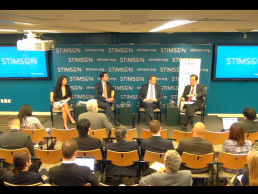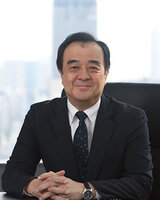Event Report Foreign Affairs and National Security
CIGS and Stimson Joint Seminar "Course Change or Full Speed Ahead? Post-Midterm U.S Foreign Policy's Impact on Indo-Pacific"
November 2, 2018,
11:00
- 12:00
Venue: The Stimson Center, 1211 Connecticut Ave, NW, 8th Floor, Washington DC, 20036

(Ms. Tatsumi, Mr. Twining, Mr. Mitchell and Mr. Miyake from the left)
Seminar outline
Title: "Course Change or Full Speed Ahead? Post-Midterm U.S Foreign Policy's Impact on Indo-Pacific"
Speakers:
Derek Mitchell, President, National Democratic Institute (NDI) Ambassador
Daniel Twining, President, International Republican Institute (IRI)
Kuni Miyake, Research Director for Foreign and National Security Affairs, CIGS
Yuki Tatsumi, Co-Director of Stimson's East Asia Program and Director of the Japan Program, and Senior Research Fellow, CIGS
Summary of Seminar
Summary of SeminarPDF: 229KB
Abstract of the Speech
The United States midterm elections may determine whether U.S. foreign policy changes course in 2019 or holds steady. Under the Trump administration, the U.S. foreign policy agenda has undergone some changes, rarely mentioning U.S. values and at times displaying disconnect between rhetoric and policy implementation. Particularly in the Indo-Pacific region, where the Trump administration has discussed disengagement and international cooperation by turns, post-election U.S. foreign policy will impact how current shifts in the security environment play out. After the midterms, will Congress forge a new consensus on how foreign policy should be conducted? Or if there is no course change, what will be the potential consequences for future presidents' foreign policy agenda? The seminar discussed these questions, as well as how U.S. foreign policy looks from the outside, and what impact it will have on the Indo-Pacific and beyond.
Speaker's profile
DEREK MITCHELL, President, National Democratic Institute (NDI) Ambassador
Derek Mitchell returned to NDI in 2018 just over two decades after he departed the Institute in 1997, at the conclusion of nearly four years as Senior Program Officer for Asia and the former Soviet Union. In the interim, Ambassador Mitchell has had a distinguished career in and out of the U.S. government, in which he has witnessed the connection between democracy and international security. From 2012 to 2016, he served as U.S. Ambassador to the Republic of the Union of Myanmar (Burma). From 2011 to 2012, he served as the U.S. Department of State's first Special Representative and Policy Coordinator for Burma, with the rank of ambassador. Prior to this appointment, Ambassador Mitchell served as Principal Deputy Assistant Secretary of Defense, Asian and Pacific Security Affairs (APSA), in the Office of the Secretary of Defense (2009-2011); as Senior Fellow and Director of the Asia Division of the International Security Program at CSIS (2001-2009); and as Special Assistant for Asian and Pacific Affairs in the Office of the Secretary of Defense (1997-2001). Ambassador Mitchell began his work in Washington as a foreign policy assistant in the office of Senator Edward M. Kennedy (D-MA) from 1986 to 1988. Ambassador Mitchell has authored numerous books, articles, policy reports, and opinion pieces on international affairs.
DANIEL TWINING, President, International Republican Institute (IRI)
Daniel Twining is the president of the International Republican Institute, where he leads the Institute's mission to advance democracy and freedom around the world. He leads IRI's team of nearly 400 global experts to link people and governments, motivate people to engage in the political process, and guide politicians and government officials to be responsive to citizens. Previously, he served as counselor and director of the Asia Program at The German Marshall Fund of the United States. Prior to GMF, Twining served as a member of the U.S. Secretary of State's Policy Planning Staff, as the foreign policy advisor to U.S. Senator John McCain, and as a staff member of the U.S. Trade Representative. He has taught at Georgetown University and served as a military instructor associated with the Naval Postgraduate School. He has been a columnist for Foreign Policy and Nikkei and served as an advisor to six presidential campaigns.
KUNI MIYAKE, Research Director for Foreign and National Security Affairs, CIGS
Kuni Miyake is the Research Director for Foreign and National Security Affairs at the Canon Institute for Global Studies. He is also a Visiting Professor at Ritsumeikan University. In 2006-2007, he was Executive Assistant to Akie Abe in the Office of the Prime Minister of Japan. Miyake joined the Ministry of Foreign Affairs in Japan (MOFA) in 1978. Until he left MOFA in 2005, he served in a number of senior positions, including Deputy Director-General of the Middle East Bureau; Minister at the Embassy of Japan in Iraq and Japan's Representative to the Coalition Provisional Authority (CPA); Charge d'Affaires at the Embassy of Japan in Iraq, Minister for Public Affairs at the Embassy of Japan in China; and Directors of Japan-U.S. Security Treaty Division, First Middle East Division and Second Middle East Division in MOFA. He graduated from the Law Faculty of the University of Tokyo.
YUKI TATSUMI, Co-Director, East Asia Program, Stimson and Senior Research Fellow, CIGS (Moderator)
Yuki Tatsumi is the Co-Director of Stimson's East Asia Program and Director of the Japan Program. Previously, Tatsumi worked as a Research Associate at the Center for Strategic and International Studies and as the Special Assistant for Political Affairs at the Embassy of Japan in Washington, D.C. In September 2006, Tatsumi testified before the House Committee on International Relations. She is a recipient of the 2009 Yasuhiro Nakasone Incentive Award and in 2012 earned the Letter of Appreciation from the Ministry of National Policy of Japan for her contributions to advancing mutual understanding between the United States and Japan. A native of Tokyo, Tatsumi holds a B.A. in liberal arts from the International Christian University in Tokyo, Japan and an M.A. in international economics and Asian studies from Johns Hopkins University SAIS.

